Vanessa Paranjothy Wants You to Talk About Periods Freely
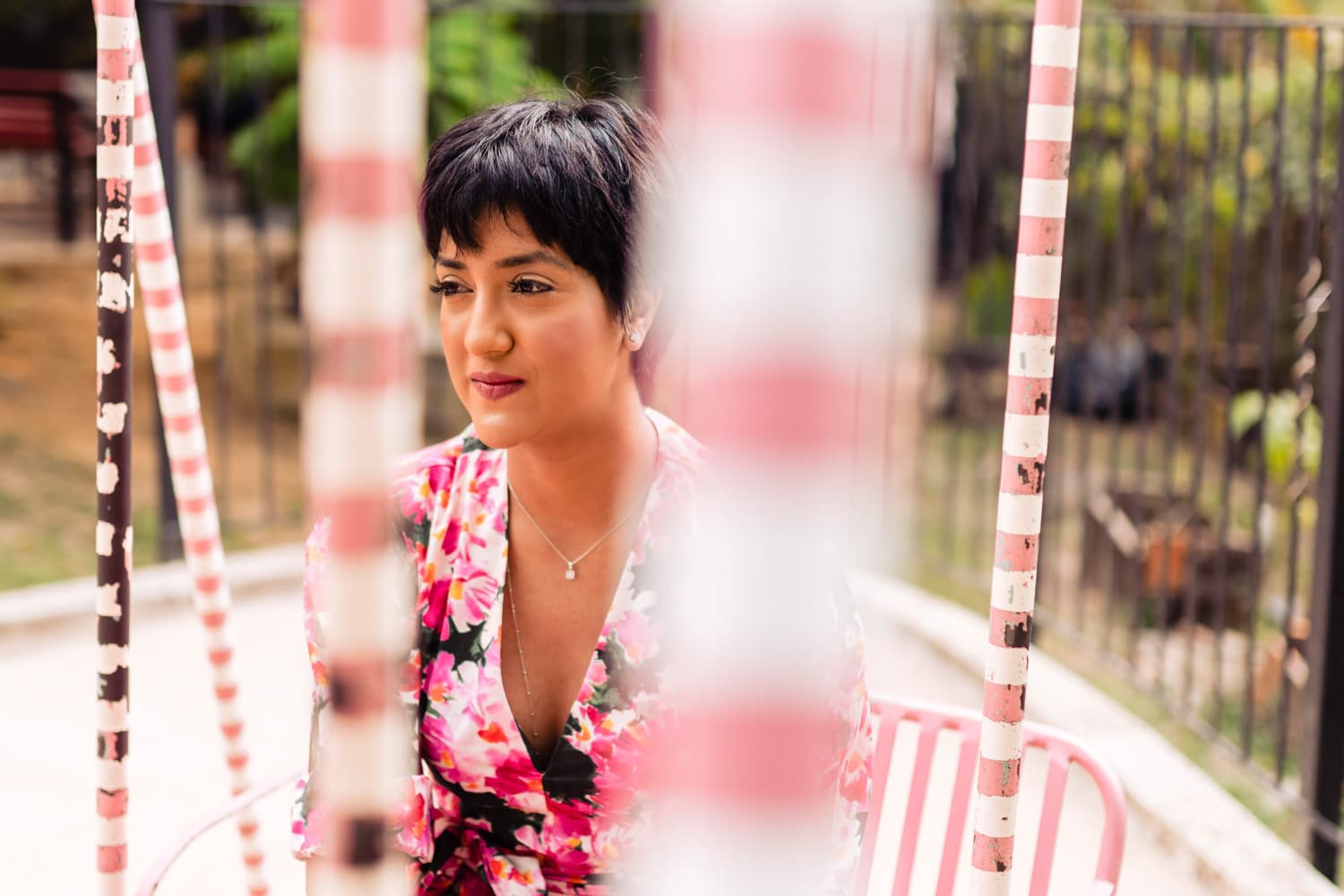
“There’s been a murder in the basement.” Of the many euphemisms that describe the arrival of menstruation, this one resonates the most with me. It captures the sheer pain of the bloody affair, which can feel like death at its worst, while evoking an image of the hidden and unseen, tucked discreetly away in the basement. The topic often comes with institutionalised silence too. You either keep mum about it, or converse in code. Anyone who speaks too plainly about such natural bodily phenomena would be frowned upon and deemed an uncouth blabbermouth. So we suppress this fear, and over time, learn to bear this secret alone. It’s no wonder we know so little about our monthly visitor. Despite being well-educated, well-read individuals in a first-world country with access to lightning-speed WiFi, many of us remain woefully ignorant about the part of our body that serves as a portal to the birth of civilisations. While shame prevents us from having necessary, objective conversations about periods, what comes out of that is the perpetuation of ruinous claptrap—myths that say period blood is dirty, and menstruating women are impure. In certain parts of Nepal, such notions are emblematic of female oppression, where women are literally ostracised and placed in isolated huts during their menstruation period. As mainstream culture embraces body positivity, more women have in recent years emerged as champions of free bleeding—a form of activism that seeks to empower women to own their menstrual cycles, instead of seeing them as a loathsome weakness. Others have committed themselves to work on destigmatising periods through less extreme methods. One such woman is Vanessa Paranjothy, who co-founded Freedom Cups in 2016 with her two sisters. This homegrown social enterprise manufactures menstrual cups and is the only start-up of its kind in Southeast Asia that works on a “buy one, give one” model to benefit underprivileged, illiterate women from rural communities. “Something long-term and reusable would make perfect sense for women on the ground who hail from low-resource communities,” says the former national footballer, who spent the last year in New York as part of the inaugural class of Obama Foundation Scholars at Columbia University. A menstrual cup isn’t some iffy, New Age doohickey. It’s a real, sustainable solution that could drastically cut down the waste of sanitary products such as pads and tampons. Before you brush it off as a non-issue, consider the statistics collected by the Trash Free Seas programme at Ocean Conservancy. In just one day, the non-profit collected almost 28,000 pieces of used tampons on beaches around the globe. These disposables are typically either wrapped in plastic or made out of a medley of non-biodegradable material. Besides clogging up waterways, they risk the development of toxic shock syndrome. Medical-grade silicone cups, such as the ones by Freedom Cups, on the flip side, aren’t as detrimental. Built to last up to 10 years, they work just as well as regular tampons, if not better (it creates a vacuum seal when inserted), in preventing leakages. “I feel like this is a new chapter. I recently turned 30, which is a personal milestone. We just completed a full rebranding of Freedom Cups as well. Previously, we were unsure of the market and kept everything safe. Now, we’re a lot more confident, sassy, sophisticated and fun,” says Vanessa. It seems society too is starting to turn the page from the taboos of menstruation to the empowerment of women, thanks to the bravery of a few who are no longer holding their tongues in the name of entrenched propriety.
ANGELA LOW: What was the catalyst of Freedom Cups? How did the idea come about?
VANESSA PARANJOTHY: I spent 10 years in a girls’ school, and even in a setting where everyone’s more or less female, periods was one of the things that was always swept under the rug. I always wondered what it’d be like for a woman on her period who had no access to pads, tampons, toilets or clean running water. Periods are such a hassle as it is. I can only imagine if you remove any of those variables, it would become quite hellish. A close friend of mine went to Guatemala for an exchange programme, and when he came back, he mentioned menstrual cups in a conversation we had. I found it quite strange that, as a Singaporean woman who's had access to the Internet for at least 15 years, I'd never heard of a menstrual cup. That was when the seed was planted.
ANGELA: Why do you think there's a stigma around menstruation and what are the subtle factors that play into this stigma?
VANESSA: That's a very good question. There's so much shame, silence, and ignorance surrounding the topic of periods. We're always debating the cause of that. Firstly, there’s organised religion. Every major religion talks about periods in a not-so-positive light. Then, there’s inadequate sex education. The most common question that we get is, “If I insert the cup, will it get lost?” The first 100 times this question was asked, we thought it was funny. After that, you realise there’s a real gap in people’s knowledge about their bodies.
That’s why we’re trying to plug the educational gap now. We talk to policymakers about how education has to start from a young age, and give talks at universities, international schools and polytechnics. We’re also working on a little handbook for girls who are about to get their first periods. It’s for them to learn everything they need to know in a fun, objective, and interactive way, just in case the schools aren’t teaching it to them or their parents are too awkward to have the conversation.
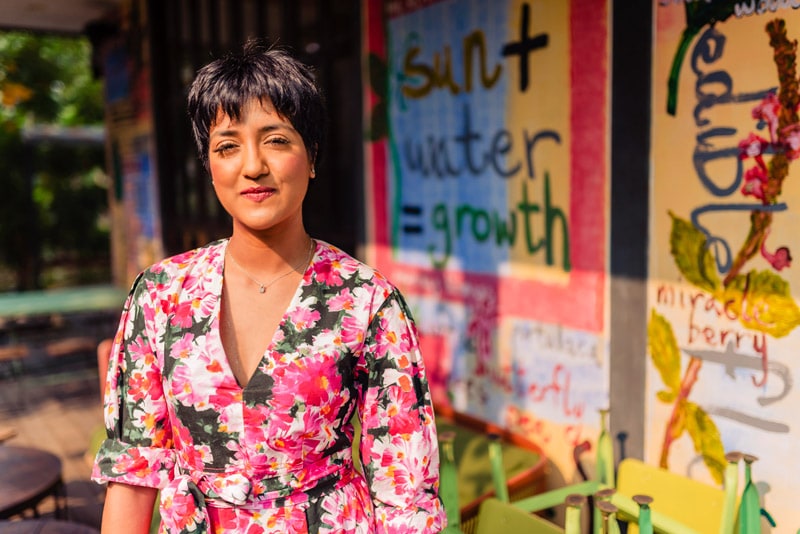
ANGELA: Tell me more about the early days of creating Freedom Cups.
VANESSA: There are so many pieces to this. While it has always been kind of an uphill task, it has also been fun. We just spoke to a large retailer and the conclusion of that meeting summarises our journey perfectly. They said, “You guys are the future, but the market’s not there yet.” Even though there are these trying moments where we seem to come up against brick walls, we have so much fun because we get to craft conversations and be a part of changing women's perspectives of their own bodies and periods. Periods have never been a sexy topic, but it’s having its time in the sun now, and Singapore is starting to see it. When we first started, we’d set up booths at art markets and some women would grab their children and move quickly in the opposite direction. Now, we have women telling us that they’re trying to convince their mothers to use the cups. It's been very heartening to witness the change.
ANGELA: Are your consumers mostly from Singapore?
VANESSA: We ship worldwide, but we’re working mainly in Singapore at the moment. We make sales in the US, Australia, New Zealand, and Malaysia, and we’re hoping to move into Vietnam and Indonesia by the end of the year.
ANGELA: Right now, what are your day-to-day tasks?
VANESSA: Being a start-up, we handle pretty much everything. We are always on the look-out for new retailers and new spaces where we can stock our cups. We do the packing, mailing, and deliveries out of the Singapore office, as well as craft curriculums. We’re in about 10 countries now for on-the-ground distribution projects. Each distribution session is accompanied by a one-hour session, where we teach women about their bodies and periods. We are also constantly speaking to people who are either educators or NGOs working on the ground, and people working with women of all stripes—sex workers, refugees, villagers, indebted workers, nuns, hospice workers. As a small team of five, all of us wear multiple hats. Today, I'm in a nice dress and heels. Other days, I'm in overalls and sneakers either driving around making deliveries if our delivery driver is maxed out, giving talks, doing media interviews, or speaking to new stockists. The list can get quite long.
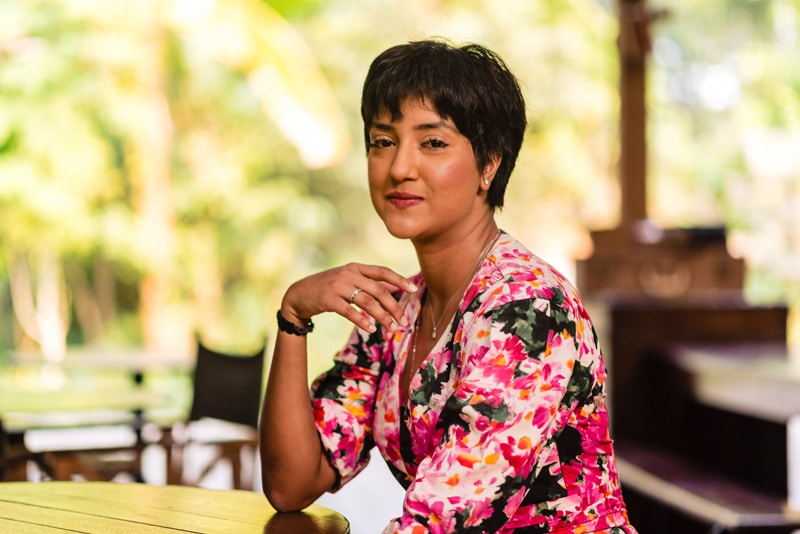
ANGELA: What’s it like working with your sisters?
VANESSA: It's perfect. I feel like I'm the luckiest person. I get to sleep well at night knowing that I've got my back covered by the two people I trust the most. Also, it helps that our strengths and weaknesses seem to complement each other. For example, I’m not the best at sales, but my sisters are incredible. I remember the first art market we ever participated in. We were in the car on the way there, and I said, "Guys, this is not going to work. Who’s even going to want to talk to us about periods? People will be grossed out." Rebecca just looked me square in the eyes, and said, “Vanessa, you can’t be awkward about it. If not, everyone’s going to be awkward about it.” That has carried me through the times I’ve felt nervous speaking about periods and women’s bodies. Another great thing about working with family is that they can give you brutally honest feedback and you know it comes from a place of love.
ANGELA: What is your competitive edge over other menstrual cups in the market?
VANESSA: We’re the first in Southeast Asia to manufacture our own cups and work on a “buy one, give one” model. A lot of our efforts are directed at trying to make periods a better experience for women, who need help with having more sanitary periods. And that’s not a marketing gimmick. We truly believe that periods should not be a problem in the 21st century. It’s simply the right thing to do. Beyond that, we have manufactured our Freedom Cups to be smaller and softer than the international average, making it more suitable for Asian women. Not that our bodies are anatomically different, but many of us are making the leap from pads to these cups without using tampons in between. Our cups are also made in the USA, FDA-registered, and are made of 100% medical-grade silicone. We are also about 25% to 35% cheaper than the other cups of our standard in the market.
"For the first two years, Freedom Cups was like an experiment, especially when you receive so many no’s. But I’m genuinely grateful for the no’s, as they’re just as important as the yes’s."
ANGELA: Was Freedom Cups initially self-funded?
VANESSA: Yes. Most of it was personal savings. Then, we tried our hand at an Indiegogo campaign. We wanted to raise this grand, big sum of $50,000, but it was probably the most dismal failure in Indiegogo history! [laughs] We raised $2,000, mainly from my parents and grandparents. After two weeks of “campaigning”, we decided we were never going to ask for donations again. It was literally the worst experience, having to ask someone to donate money and you being accountable to them. We decided then and there that we’re going to have to make our own money, and that’s when we incorporated ourselves as a business and never looked back.
ANGELA: Are there any plans to get external funding?
VANESSA: That’s what we're thinking about now. We're still debating internally and looking at alternative financing models because a traditional VC model may not work for a social impact organisation. While we have spoken to a couple of VCs, we’re still studying the impact we have on our customers and beneficiaries, and making sure it’s positive before we decide to scale up.
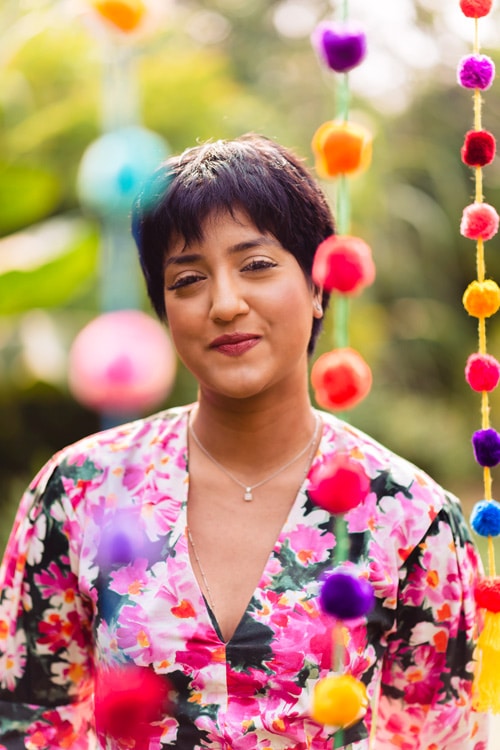
ANGELA: Since starting Freedom Cups, how would you say you've changed as a person?
VANESSA: I think I’ve changed so much. For the first two years, Freedom Cups was like an experiment, especially when you receive so many no’s. But I’m genuinely grateful for the no’s, as they’re just as important as the yes’s. I’m more confident now. Everything good that has happened is validation to me that there is a problem, that we might have a small piece of the solution, and we might be on to something that’s bigger than ourselves. The journey has also been character-building, with experiencing things like living on your own in a city that’s 24 hours away from home, and meeting top-level administrators whose footsteps I see myself eventually following. Having to learn new skills every day and roll with the punches has helped me grow in innumerable ways.
ANGELA: Do you remember the first time you tried a menstrual cup?
VANESSA: Yes, vividly. The first time I tried a menstrual cup was our own. The manufacturer sent us the first shipment of samples, and it sat on the shelf for a good six months. I didn't try it because I was so scared. We didn't have instruction booklets and I had to figure it out myself. I thought, “Holy hell, what have I gotten myself into?” I kept putting it off until our first projects in the Philippines rolled around. We were going down to three remote locations in Bacolod, the Philippines. As luck would have it, my period came on the plane, as we're about to leave. It was like a sign from a higher being. That was when I tried it.
At that moment, I knew we would be okay. I knew that anyone who tried this cup would feel the same way I did—scared at first, but just completely, utterly liberated after. But I’m not going to sugar-coat it. The first couple of tries were hard, and I hadn’t used tampons prior. I was so nervous about it, and checked for leaks every 30 minutes because you can’t feel anything. You just feel so insecure. But after the second, third and fourth time using it, it becomes second nature. It was at that point that I realised we were on to something.
"I’m sure we make a lot of people uncomfortable, but it’s not about “smashing the patriarchy”."
ANGELA: Did your perception of menstruation change?
VANESSA: Yes, definitely. Personally, it has been a real self-exploratory journey. It is a pity that women everywhere don't know enough about periods and their bodies. Because of that, we allow all this shame to be internalised because we, as women, don't know how powerful and amazing our bodies are. Just the fact that you have your period every month means you have a healthy, well-functioning body. If this was the kind of message that we propagated, as opposed to making your periods as unseen and unspoken of as possible, people’s mindsets would shift.
ANGELA: Can you tell when an individual feels uncomfortable with the topic?
VANESSA: I’m sure we make a lot of people uncomfortable, but it’s not about “smashing the patriarchy”. We’re not radicals who believe that periods are still a problem because of the “patriarchy”. For whatever reason, periods are, more often than not, considered dirty, but this is where we literally started from. A lot of old, Eastern religions celebrated this, but so many of us think it’s disgusting and unsexy. There’s a study that measured the reactions of people when they see women accidentally dropping a set of keys, or dropping a tampon. Everyone judged the women who dropped the tampons as more unkempt and less put together. On so many metrics, they were deemed as less than the women who dropped their keys. These are internalised notions. It’s crazy what we’re up against. We’re lucky enough to have been given a larger platform to talk about our views and it’s incredible how periods are slowly inching their way into the mainstream, and seen as a trending topic. This definitely wasn’t the case two or three years ago.
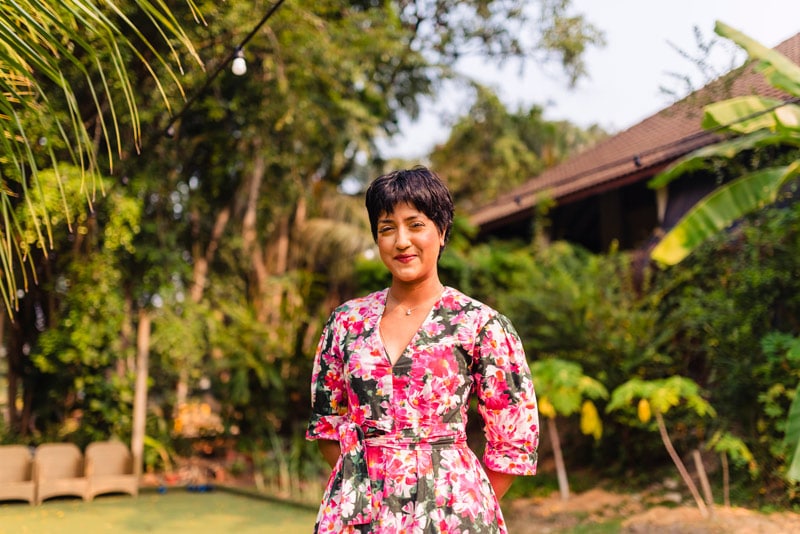
ANGELA: You mentioned in a previous interview that women from rural communities tend to be more receptive to menstrual cups than those from first-world countries. Why is that?
VANESSA: Yes, a big thing we have learnt is that it’s much easier to convince women from low-resource settings to use our cups. They’re more intuitive. We don’t even have to say much. Here, many women will ask, “Where does it go? Will it get lost?” I feel like it’s because women like us have the freedom of choice. We have enough money to afford whatever we want, and we have been socialised into thinking pads and tampons are the most sanitary options. We’ve never heard of reusables. Women from rural communities, however, have limited choice.
It’s between using rags that are constantly damp—which is perfect for urinary tract or fungal infections—and using something long-term, sustainable and might change your life. For them, it’s a simple choice. We have a picture of a woman, which is seared into my mind. During our distribution session in Uganda, one of our volunteers helped guide her through using the cup. After inserting it, she removed an old sock she was using before as her pad. We have a picture of her holding her stained sock. It’s such a powerful image, a visual reminder to us for why we do the work we do.
ANGELA: What do you think of free bleeding?
VANESSA: I don't quite understand that. I think it is more of a socio-political movement for women to own their space and bodies, and assert that their periods aren’t dirty. “If you have a problem with me bleeding out on myself, that’s your problem. It’s not mine.” It’s a powerful idea, but personally, I could not free bleed. I'm very happy with the women who have the stomach to do this, to put themselves out there in public. It’s that agency and confidence that we need to help start conversations. We have chosen to thread on a safer line with Freedom Cups. But you always need people, in any movement, to take a more extreme stance, just so the rest will perk up and start listening.
ANGELA: What does “freedom” mean to you, and has that definition changed over the years?
VANESSA: This is something I constantly think about. I've defined it in my head as “freedom to” and “freedom from”. Freedom to do whatever I choose, own my time, and be who I want to be, and freedom from the need to do something, and from societal expectations. Just living life the way I want to, on my own terms, pursuing what I deem as important with who I deem important is, to me, what freedom means.

